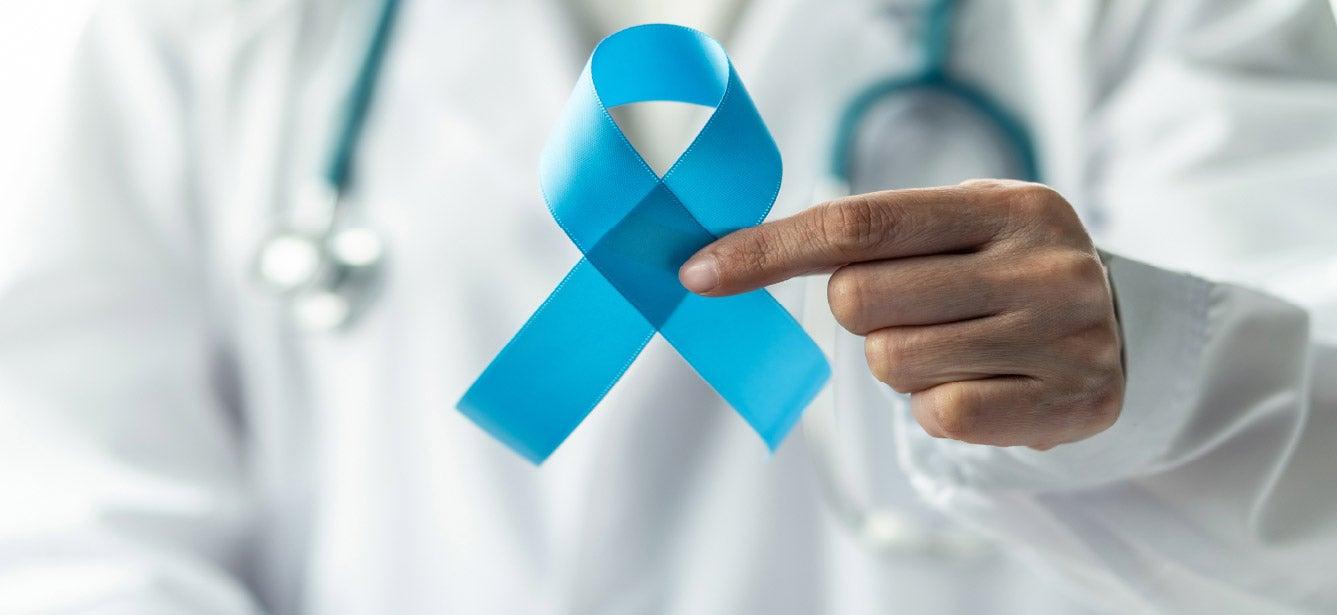Prostate Cancer: Early Signs, Symptoms, and What to Do When Diagnosed
5 min read

Related Topics
It's time for men to take charge of their health. According to the Prevent Cancer Foundation's 2024 Early Detection Survey, over 20% of men aren't scheduling their own doctor's appointments. Nearly 1 in 5 mean reportered that a relative or partner usually schedules their health care appointments.1
The significance of this is profound. Men in the U.S. are missing opportunities to prevent cancer or detect it early, with 65% reporting they are behind on at least one routine cancer screening. The prevalence of certain cancers among men--including colorectal, skin (melanoma), oral, and prostate cancers, which all have routine screenings available--shows the importance of empowering men to take charge of their health. Keeping up with your annual physical appointments and building a trusting relationship with your health care provider can keep you on track with your routine cancer screenings and other preventive checks that can be lifesaving.
For prostate cancer screening, begin with a conversation with your health care provider to determine what is recommended for you. The more familiar they are with your personal and family health history, the more they can help you make an informed decision.
Most people don’t experience signs or symptoms of cancer until it’s in advanced stages. With routine screenings, you can detect cancer early (before signs or symptoms appear!)—which is critical, because Early Detection = Better Outcomes. Early detection of cancer can mean less extensive treatment, more treatment options and better chances of survival.
For prostate cancer screening, it’s not as simple as making an appointment when you turn a certain age. It takes a conversation—or a few conversations—with your health care provider to determine what is recommended for you.
Read on to learn more about prostate cancer risks, symptoms, screening and treatment before you schedule your next appointment with your health care provider.
How do you get prostate cancer?
The exact causes of prostate cancer are unknown, but some factors increase your risk of getting the disease. Age is the most common risk factor—most cases are diagnosed in men older than 65. Black men are more likely to get and die from prostate cancer than white or Hispanic men,1 and these trends appear to be worsening.
Your genes can also affect your risk—if you have a BRCA1 or BRCA2 gene mutation, Lynch syndrome or a family history of prostate cancer, that increases your risk of the disease. Smoking may also increase your risk, but the sooner you quit, the better your prognosis may be. A study of people who with a prostate cancer diagnosis found those who smoked had higher risks of dying and cancer recurrence, while those who had quit smoking for 10 years had the same risk of death from prostate cancer as those who had never smoked.2
What are the early signs and symptoms of prostate cancer?
During the early stages of prostate cancer, people usually don’t experience any signs or symptoms. As the disease progresses, people may notice urinary problems, such as:
- Having trouble starting or stopping urine flow
- Having a weak or interrupted urine flow
- Feeling pain or a burning sensation while urinating
- Blood in the urine
- Painful or difficult erection
- Pain in the lower back, pelvis or upper thighs
These can also be symptoms of other conditions, such as an enlarged prostate or benign prostatic hyperplasia (BPH), so talk to your health care provider if you experience any of these symptoms.
How do you check for prostate cancer?
Prostate cancer screening can be done through a Prostate Specific Antigen (PSA) test, a blood test that your health care provider can administer. An elevated level may indicate cancer, but may also be caused by other conditions, so your provider may recommend additional testing or a biopsy to help reach a diagnosis. Your health care provider can also perform a digital rectal examination, where the provider uses a gloved finger to examine the rectum, but this generally is less effective than a PSA test at finding prostate cancer.
When should you get checked for prostate cancer?
If you’re at average risk for prostate cancer, start talking to your health care provider about the pros, cons and risks of prostate cancer checks at age 50. This conversation should start earlier if you are Black or have a family history of the disease. If you are Black or if you have a close relative (father or brother) who had prostate cancer before age 65, start talking to your health care provider about prostate cancer when you are 45. If you have more than one close relative diagnosed with prostate cancer before 65, start that talk when you turn 40.
Why talk to your doctor about prostate cancer screening, diagnosis, and treatment?
PSA testing can help diagnose prostate cancer before symptoms start, which can be lifesaving. However, some prostate cancers grow slowly and would never progress enough to be harmful. Your doctor can help you determine when (and if) testing is recommended for you based on your family and personal health history.
If you are diagnosed with prostate cancer, you and your health care provider may decide on “active surveillance”—rather than immediate treatment—with regular follow-ups every few months to avoid any unnecessary side effects and complications of treatment. If the cancer progresses, you and your care team may reassess your treatment plan.
Can you cure prostate cancer?
When detected and treated early, prostate cancer treatment, which typically involves surgery, radiation, hormone therapy, or a combination, is highly effective. For localized or regional prostate cancers (before the cancer has spread to other parts of the body), the five-year survival rate is nearly 100%. Early detection of prostate cancer followed by prompt treatment saves lives, so talk to your health care provider about screening.
Sources
1. National Cancer Institute. African American Men More Likely to Die from Low-Grade Prostate Cancer. Jan. 28, 2019. Found on the internet at https://www.cancer.gov/news-events/cancer-currents-blog/2019/prostate-cancer-death-disparities-black-men
2. Stacey A. Kenfield, et al. Smoking and Prostate Cancer Survival and Recurrence. JAMA. June 22, 2011. Found on the internet at https://www.ncbi.nlm.nih.gov/pmc/articles/PMC3562349/




